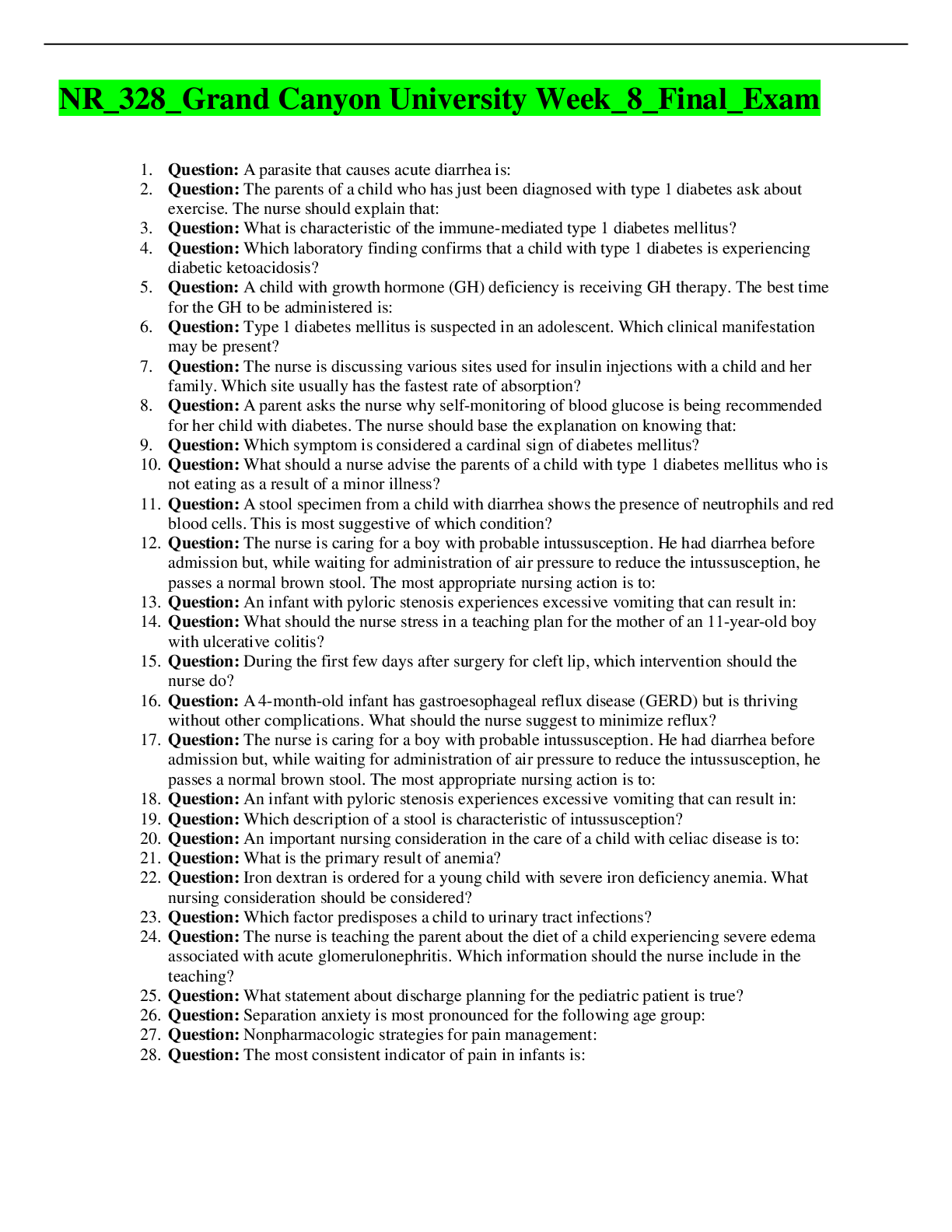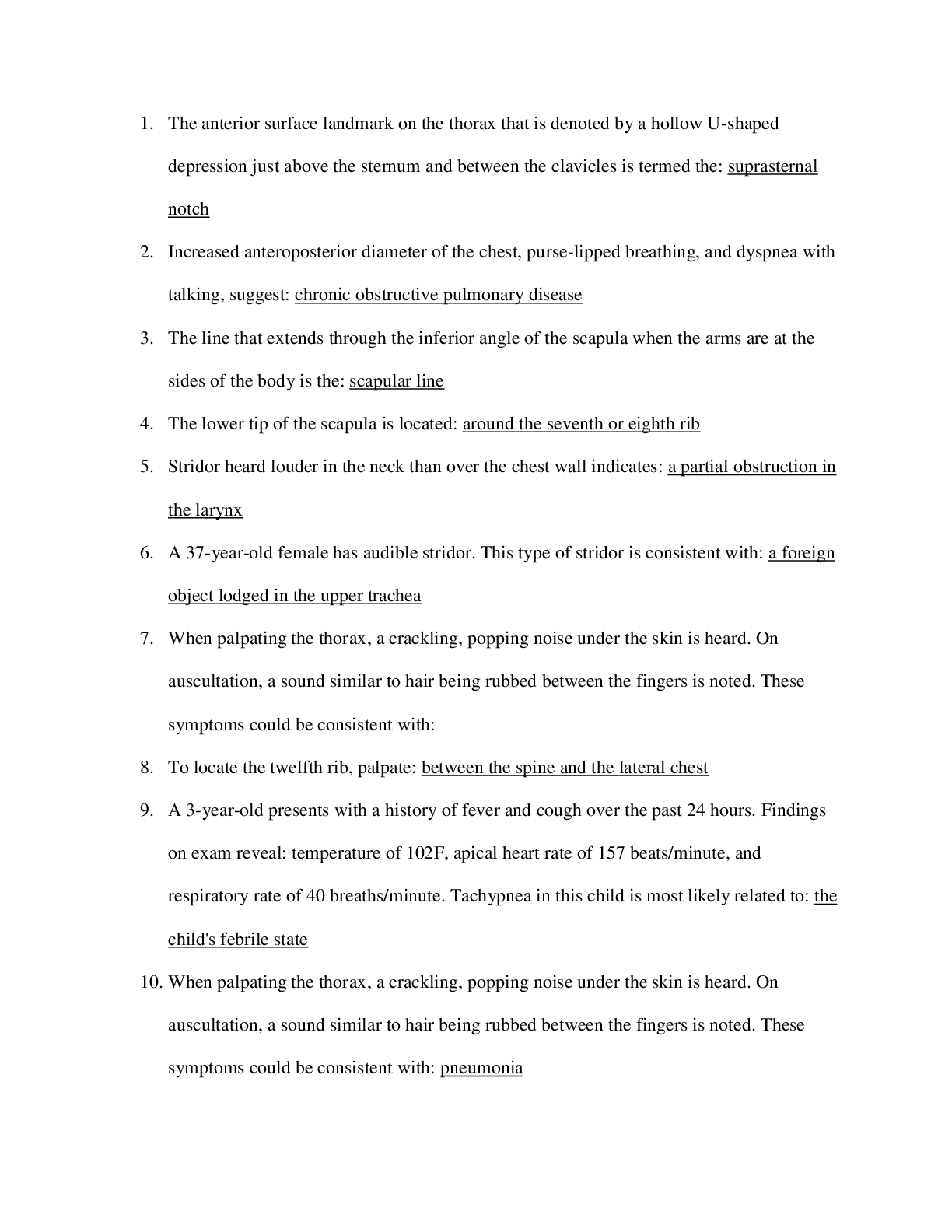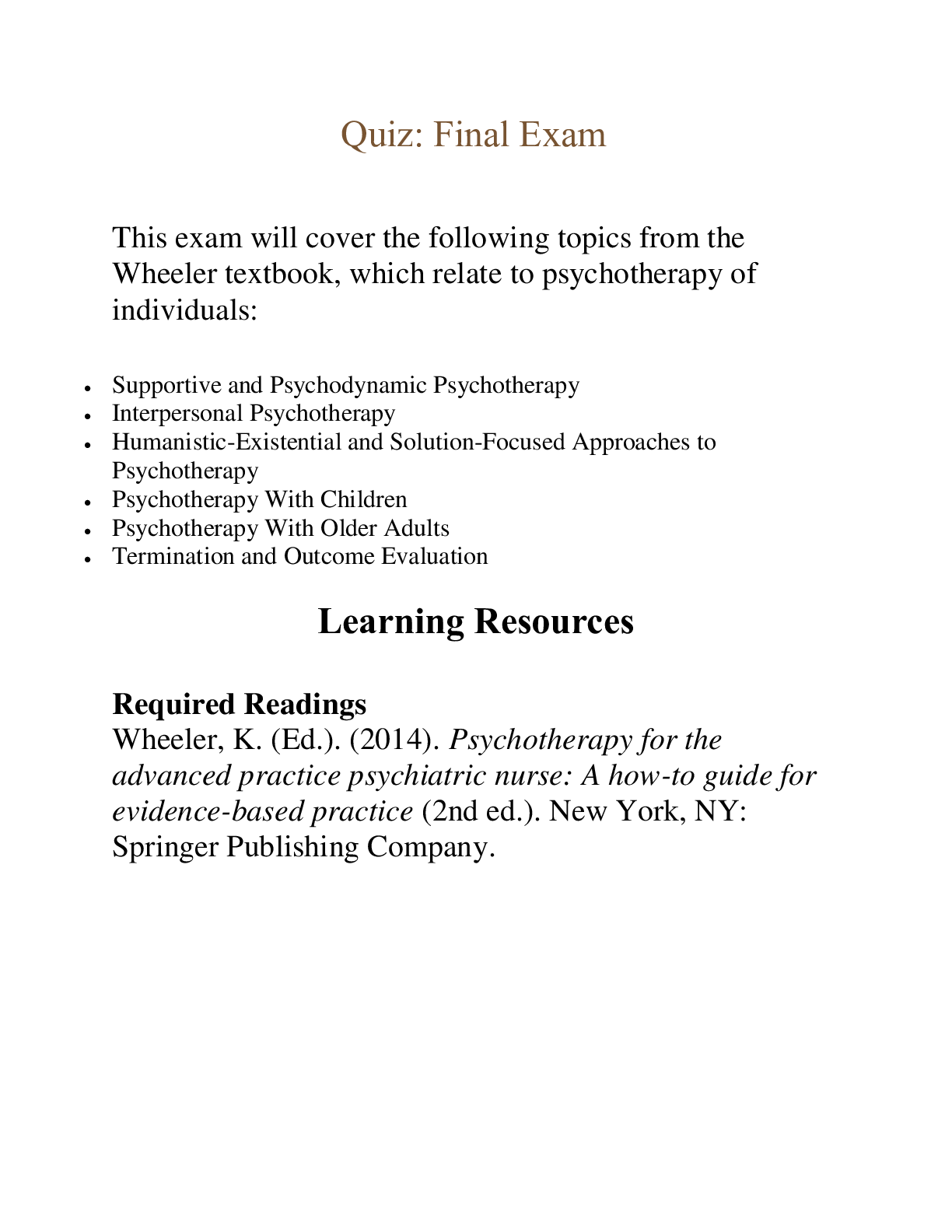*NURSING > QUESTIONS & ANSWERS > HESI Preparation Exam, N314 Psychiatric Nursing Review FINAL EXAM (A Grade), 100 Latest Questions an (All)
HESI Preparation Exam, N314 Psychiatric Nursing Review FINAL EXAM (A Grade), 100 Latest Questions and Last Page Answer Section, All Correct Study Guide, Download to Score A
Document Content and Description Below
HESI Preparation Exam, N314 Psychiatric Nursing Review: FINAL EXAM (A Grade), 100 Latest Questions and Last Page Answer Section, All Correct Study Guide, Download to Score A Multiple Choice Identify... the choice that best completes the statement or answers the question. 1. A new staff nurse completes orientation to a psychiatric unit. This nurse may expect an advanced practice nurse to perform which additional interventions? a. Conduct mental health assessments b. Establish therapeutic relationships c. Individualize nursing care plans d. Prescribe psychotropic medication 2. Two nursing students discuss their career plans after graduation. One student wants to enter psychiatric nursing. The other asks, “Why would you want to be a psychiatric nurse? The only thing they do is talk. You’ll lose all your skills.” Select the best response. a. “Psychiatric nurses practice in safer environments than other specialties. Nurse-to- patient ratios must be better because of the nature of the patients’ problems.” b. “Psychiatric nurses use complex communication skills as well as critical thinking to solve multidimensional problems. I am challenged by those situations.” c. “I think I will be good in the mental health field. I did not like clinical rotations in school, so I do not want to continue them after I graduate.” d. “Psychiatric nurses do not have to deal with as much pain and suffering as medical- surgical nurses do. That appeals to me.” 3. Which finding best indicates that the goal “Demonstrate mentally healthy behavior” was achieved? A patient: a. sees self as approaching ideals and capable of meeting demands. b. seeks others to assume responsibility for major areas of own life. c. behaves without considering the consequences of personal actions. d. aggressively meets own needs without considering the rights of others. 4. A 40-year-old who lives with parents and works at an unchallenging job says, “I’m as happy as anyone else, even though I don’t socialize much outside of work. My work is routine, but when new things come up, my boss explains things a few times to make sure I catch on. At home, my parents make decisions for me, and I go along with their ideas.” The nurse should identify interventions to improve this patient’s: a. self-concept. b. overall happiness. c. appraisal of reality. d. control over behavior. 5. A 26-month-old displays negative behavior, refuses toilet training, and often says, “No!” Which psychosocial crisis is evident? a. Trust versus mistrust b. Initiative versus guilt c. Industry versus inferiority d. Autonomy versus shame and doubt 6. The parent of a 4-year-old rewards and praises the child for helping a younger sibling, being polite, and using good manners. The nurse supports the use of praise related to these behaviors. These qualities will likely be internalized and become part of the child’s: a. id. b. ego. c. superego. d. preconscious. 7. A patient had psychotherapy weekly for 5 months. The therapist used free association, dream analysis, and facilitated transference to help the patient understand conflicts and foster change. Select the term that applies to this method. a. Rational-emotive behavior therapy b. Cognitive-behavioral therapy c. Psychodynamic psychotherapy d. Operant conditioning 8. A cognitive strategy the nurse could use to help a dependent patient would be: a. avoidance training. b. filling the patient’s pill minder. c. interpreting the patient’s dream content. d. examining the patient’s fears related to being independent. 9. A patient asks, “What are neurotransmitters? The doctor said mine are imbalanced.” Select the nurse’s best response. a. “How do you feel about having imbalanced neurotransmitters?” b. “You must feel relieved to know that your problem has a physical basis.” c. “Neurotransmitters are substances we eat daily that influence memory and mood.” d. “Neurotransmitters are natural chemicals that pass messages between brain cells.” 10. A nurse assesses that a patient has fear as well as increased heart rate and blood pressure. The nurse suspects increased activity of which neurotransmitter? a. GABA b. Histamine c. Acetylcholine. d. Norepinephrine [Show More]
Last updated: 2 years ago
Preview 1 out of 81 pages
, 100 Latest Questions and Last Page Answer Section, All Correct Study Guide, Download to Score A.png)
Buy this document to get the full access instantly
Instant Download Access after purchase
Buy NowInstant download
We Accept:

Reviews( 0 )
$15.00
Can't find what you want? Try our AI powered Search
Document information
Connected school, study & course
About the document
Uploaded On
May 07, 2021
Number of pages
81
Written in
Additional information
This document has been written for:
Uploaded
May 07, 2021
Downloads
0
Views
78


 Questions and Answers (latest Update), All Correct, Download to Score A.png)






, (A Grade), Questions and Answers, All Correct Study Guide, Download to Score A.png)
, Questions and Answers, All Correct Study Guide, Download to Score A.png)
, Latest Questions and Answers with Explanations, All Correct Study Guide, Download to Score A.png)



 Questions and Answers (latest Update), 100% Correct, Download to Score A.png)
, 100% Correct, Download to Score A.png)
, 100% Correct, Download to Score A.png)
, 100% Correct, Download to Score A.png)
 Questions and Answers (latest Update), 100% Correct, Download to Score A.png)
, 100% Correct, Download to Score A.png)

 Questions and Answers (latest Update), 100% Correct, Download to Score A.png)

